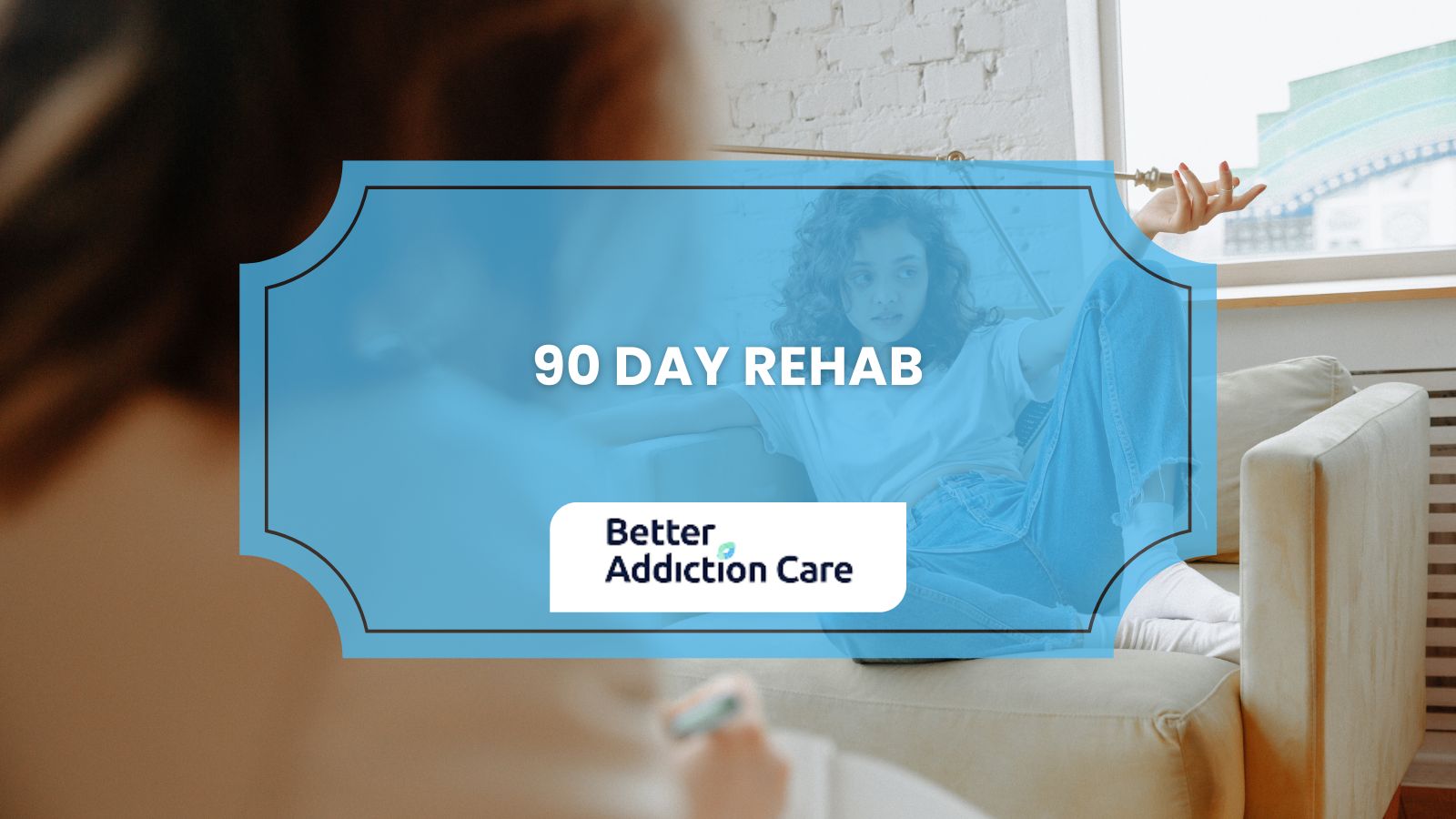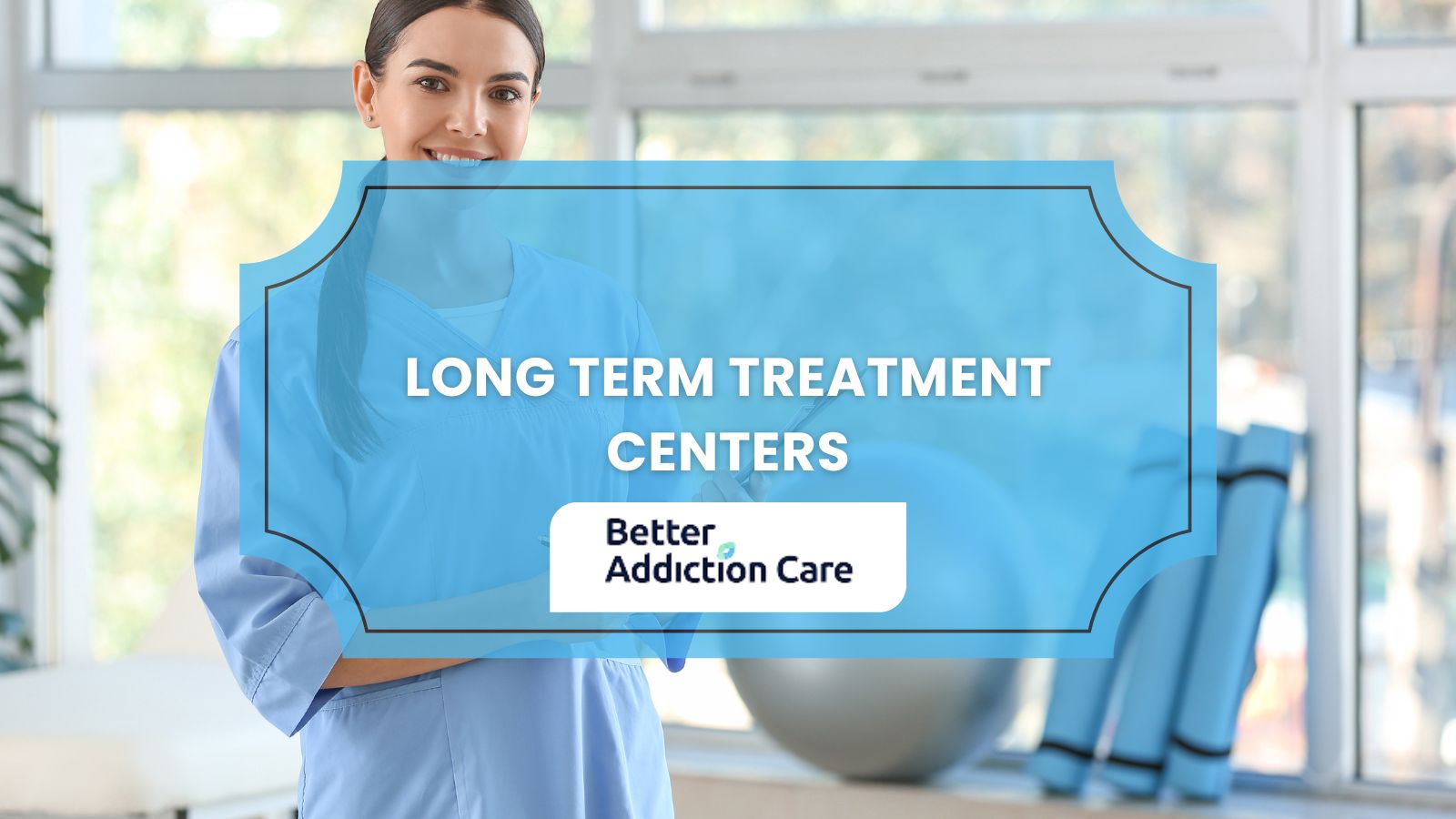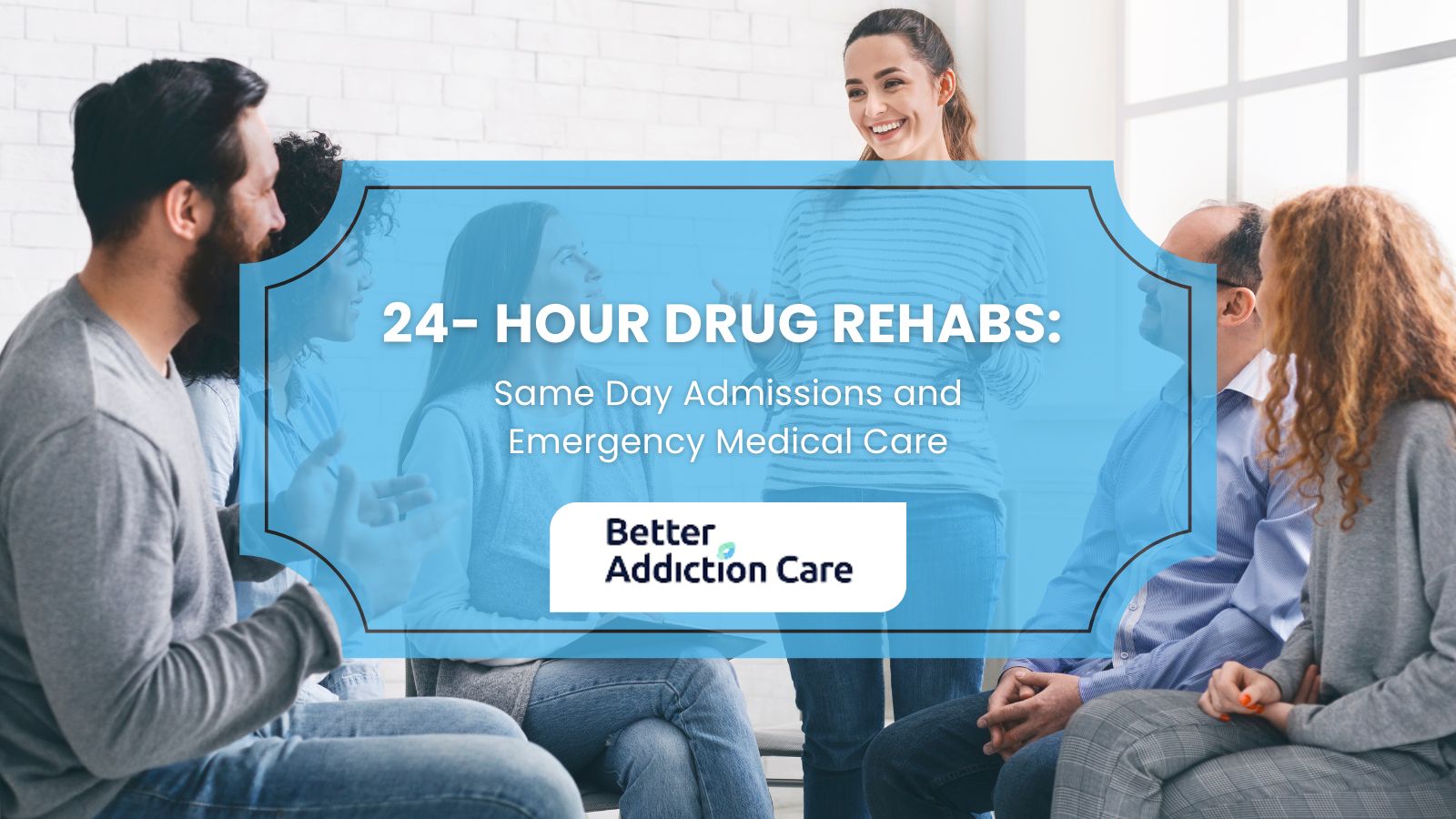Christian Rehab Centers
Christian rehab centers recognize that addiction often arises from deeper personal and emotional issues. By focusing on your mind, body, and spirit, they create a nurturing environment that empowers you to achieve lasting freedom.
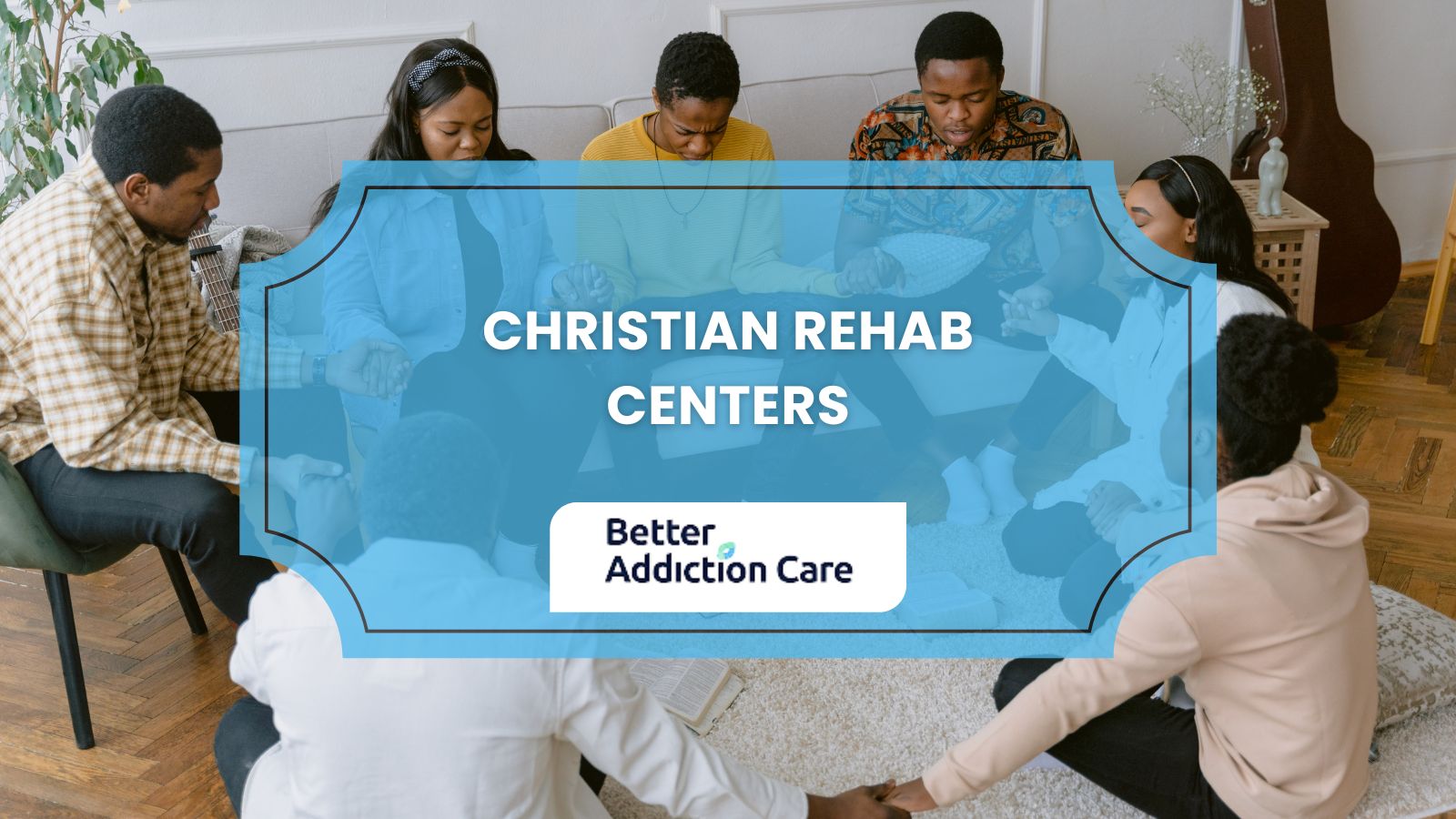
A Christian Rehab Center provides addiction recovery services that blend clinical treatment with spiritual guidance, including therapy with Christian counselors and Bible studies to support you in your faith journey. 90% of more than 100 studies reported that substance abuse was less common among more religious people. According to Grim, B. J.'s 2019 study, ‘Belief, Behavior, and Belonging: How Faith is Indispensable in Preventing and Recovering from Substance Abuse, ’ 73% of addiction treatment programs in the USA include a spirituality-based element, embodied in 12-step programs.
Christian Rehab Centers offer a range of treatment options, including Christian-based counseling, faith-focused group therapy, Bible study, pastor-led services, individualized evidence-based treatments, holistic activities, and family counseling, all aimed at supporting recovery through spiritual guidance and community support.
What Is A Christian Rehab Center?
A Christian Rehab Center is a treatment facility that offers addiction recovery services from a Christian perspective. It typically includes therapy with Christian counselors, Bible studies, and other Biblically-based services to support you in your recovery journey while you continue to practice your faith. These centers integrate spiritual guidance into the recovery process, helping you explore your struggles, understand your addiction, and strengthen your relationship with God. The holistic approach aims to address both the physical and emotional aspects of addiction through a combination of clinical treatment therapies and Christian values.
What Treatment Options Are Available at a Christian Rehab Center?
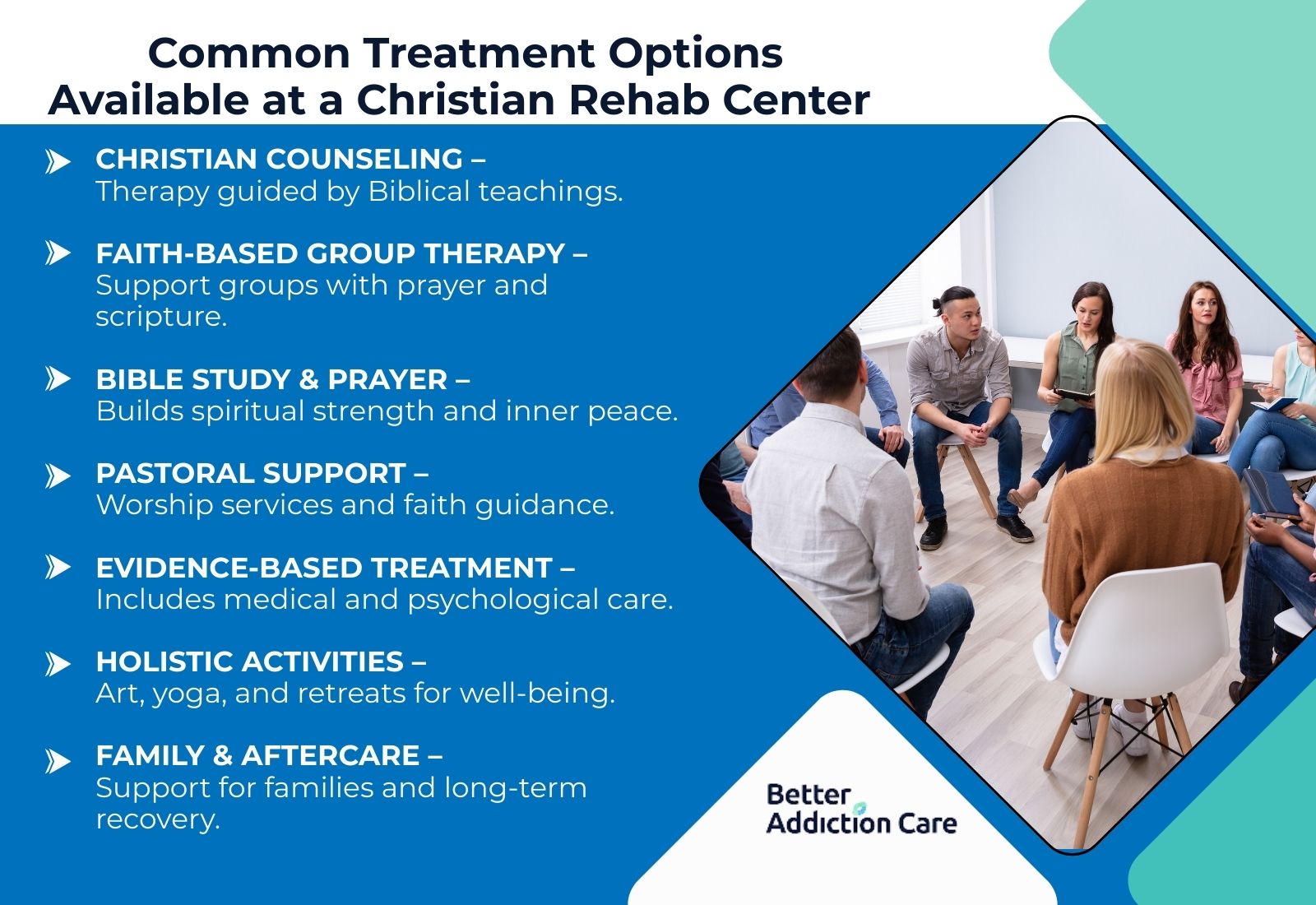
Treatment options available at a Christian rehab center include faith-integrated counseling, spiritually-focused group therapy, biblical study practices, pastoral care, evidence-based clinical treatments, holistic healing activities, and family restoration programs.
Here are the common treatment options available at a Christian Rehab center:
-
Christian-based counseling and therapy: These sessions combine traditional counseling techniques with Biblical teachings to help you understand addiction through a spiritual lens. Counselors guide you to find strength and healing by applying scripture and faith principles to overcome challenges and build resilience.
-
Faith-focused group therapy and 12-step programs: Group sessions emphasize community support and spiritual growth, encouraging you to surrender control to a higher power. These programs often incorporate prayer, worship, and scripture study alongside peer support to foster accountability and hope.
-
Bible study sessions, scripture readings, prayer, and meditation: Regular engagement with the Bible and prayer helps you deepen your faith, find comfort, and develop spiritual discipline. Meditation and reflection practices promote inner peace and strengthen your commitment to recovery.
-
Pastor-led church services and ministerial support: Many Christian rehab centers offer regular worship services and access to pastoral counseling. This spiritual leadership provides guidance, encouragement, and a sense of belonging within a faith community.
-
Individualized evidence-based treatments: Alongside spiritual care, centers provide medical detox, cognitive-behavioral therapy (CBT), motivational interviewing, and medication-assisted therapy when appropriate. These approaches address the psychological and physical aspects of addiction for comprehensive healing.
-
Holistic activities: Programs often include recreational therapy, art therapy, yoga, and spiritual retreats to support emotional well-being and stress relief. These activities encourage self-expression, mindfulness, and connection to God’s creation.
-
Family counseling and aftercare programs: Family sessions help repair relationships and build a supportive home environment. Aftercare plans include ongoing spiritual support, relapse prevention strategies, and connection to faith-based recovery groups to maintain long-term sobriety.
How Do Christian Faith-Based Recovery Programs Work?
Christian faith-based recovery programs work by integrating biblical principles, spiritual practices, and clinical therapies to address addiction holistically. They emphasize surrendering to God’s plan, using scripture and prayer to strengthen faith and reduce cravings. Programs often combine community support (e.g., 12-step groups) with personalized counseling, fostering accountability and spiritual growth. By nurturing the mind, body, and spirit, these programs aim to heal the root causes of addiction and empower lasting sobriety through faith.
What Are The Benefits Of Christian Drug Rehabilitation Programs?
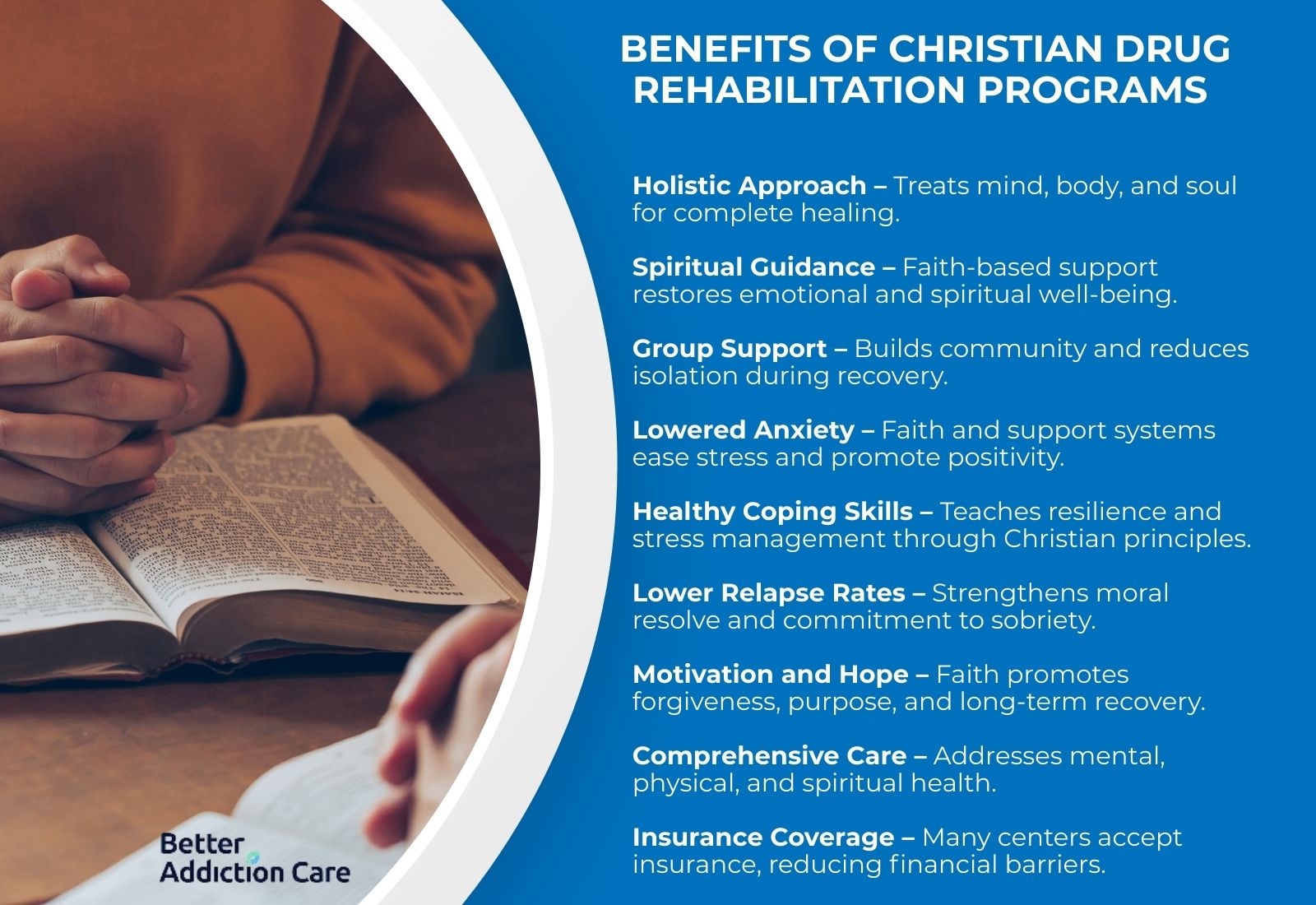
The benefits of Christian drug rehabilitation programs include holistic healing, spiritual guidance, supportive community environments, reduced anxiety, development of healthy coping skills, and lower relapse rates.
Here are the key benefits of Christian drug rehabilitation programs:
-
Holistic Approach: A holistic approach treats the whole person—mind, body, and soul. This comprehensive healing addresses symptoms of addiction and underlying issues that contribute to addiction.
-
Spiritual Guidance: The integration of faith into therapy and spiritual disciplines provides significant benefits by restoring emotional and spiritual well-being. You learn to find strength and inspiration in your religious beliefs, which serve as a powerful source of support during challenging times.
-
Group Support: Group support in Christian treatment programs fosters camaraderie among like-minded individuals. This supportive environment alleviates stress, loneliness, and feelings of hopelessness associated with addiction. Connecting with others who understand your journey strengthens your recovery and provides encouragement.
-
Lowered Anxiety: Religious beliefs lower anxiety levels through faith and community support. Lowered anxiety promotes a positive outlook on life. This shift in perspective equips you with healthy coping skills. Healthy coping skills help you manage stress and overcome psychological hardships.
-
Healthy Coping Skills: Learning healthy coping skills through the teachings of Christianity enables you to manage stress and navigate psychological challenges. This process builds resilience and hope, empowering you to face life’s difficulties.
-
Lower Relapse Rates: Lower relapse rates stem from strengthening your moral resolve. A spiritual framework supports your ability to resist future temptations. This foundation fosters lasting sobriety and reinforces your commitment to recovery.
-
Motivation and Hope: Religious beliefs strengthen your motivation and hope for the future. You experience forgiveness for past discretions. This forgiveness fosters long-term sobriety and encourages a renewed sense of purpose.
-
Comprehensive Care: The comprehensive care offered by Christian rehab centers addresses both psychiatric and psychological needs, as well as physical health through exercise, nutritious meals, and good sleep. This thorough approach ensures that all aspects of your well-being are considered in the recovery process.
-
Insurance Coverage: Insurance coverage offered at many Christian rehabilitation centers provides peace of mind for those seeking care. This accessibility allows you to pursue the help you need without the added stress of financial concerns.
What Are The Drawbacks Of Christian Detox And Rehab Facilities?
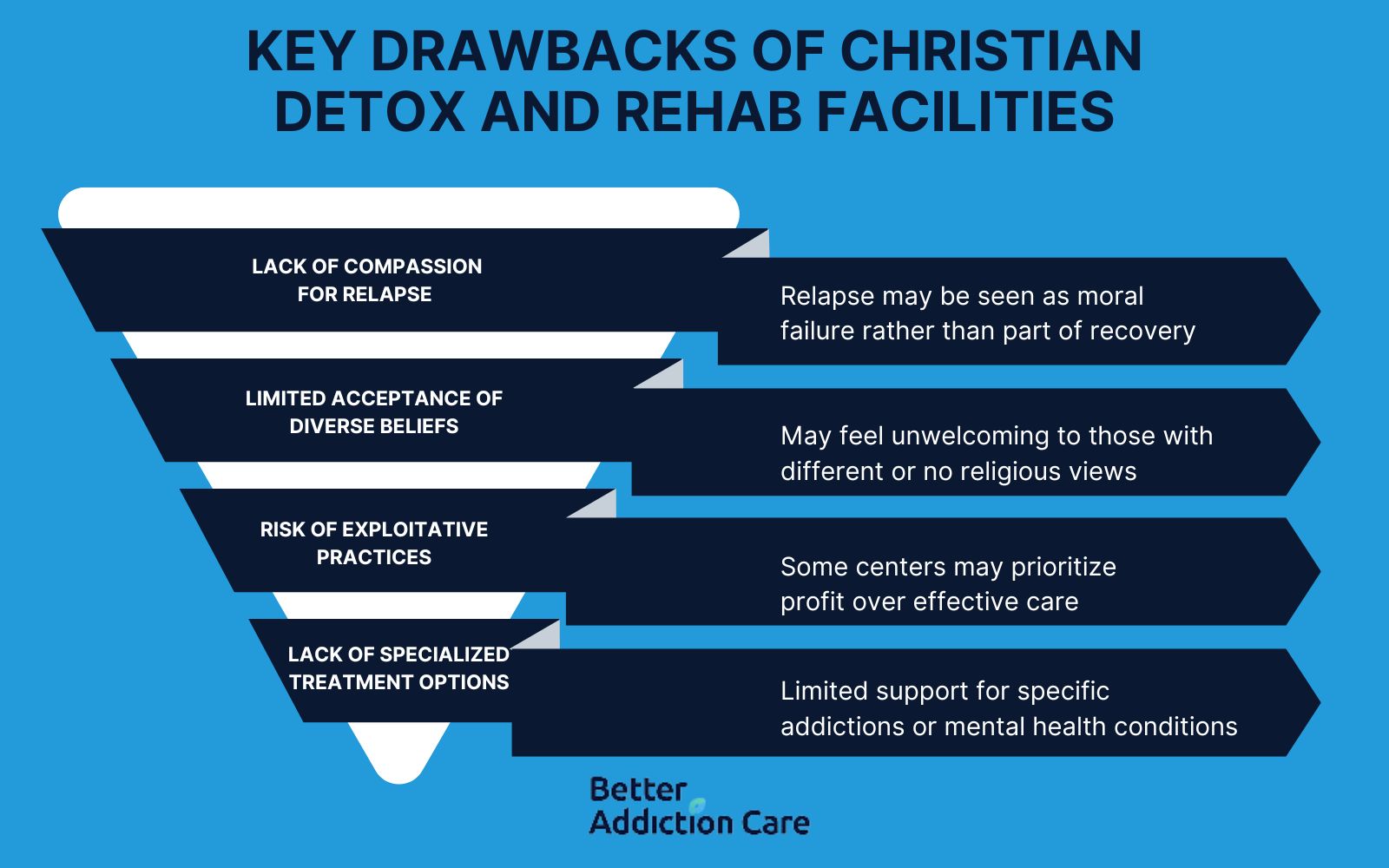
The drawbacks of Christian detox and rehab facilities include religious-focused approaches that fail to accommodate diverse beliefs, judgment toward relapse as moral failure, limited evidence-based treatment options, and exploitation of vulnerable individuals.
Here are the key drawbacks of Christian detox and rehab facilities:
-
Lack of Compassion for Relapse: Christian recovery programs treat addiction as a spiritual failing or sin. This perspective leads to the dismissal of clients who relapse, ignoring the need for ongoing support.
-
Limited Acceptance of Diverse Beliefs: Christian rehab facilities prioritize strict religious expectations. You find it challenging to engage or feel accepted if your faith background differs or if you are not ready to embrace spiritual healing.
-
Risk of Exploitative Practices: Some Christian drug rehabilitation facilities engage in predatory behaviors, such as prolonging treatment to increase profits. This approach compromises the provision of effective, evidence-based care.
-
Lack of Specialized Treatment Options: Christian rehabs provide limited specialized programs tailored to specific addiction types or co-occurring mental health disorders. This limitation reduces treatment effectiveness for you in certain situations.
Is There A Christian Alternative To AA?
Yes, there are several Christian alternatives to AA.
Here are two common Christian alternatives to AA.
-
Celebrate Recovery: This program combines the 12 steps with Biblical principles and scripture, emphasizing Jesus Christ as the higher power.
-
Alcoholics Victorious: This network of support groups focuses on dependence on Christ for recovery, using the 12 steps and the Alcoholics Victorious Creed.
These programs provide a Christian perspective on recovery, guiding members through a higher power that is based on faith in Jesus Christ.
Are Christian Rehab Centers Free?
Yes, some Christian rehab centers offer free or low-cost treatment options. Many operate through churches, charities, or community organizations as The Salvation Army’s Adult Rehabilitation Centers-which provide residential programs at no charge or minimal cost. Nonprofit faith-based programs like JC’s Recovery Center also offer quality care based on individual needs and eligibility.
What Does Christian Rehab For Teenagers Do?
Christian rehab for teenagers provides faith-based treatment through professional counseling that integrates spiritual beliefs with recovery strategies. These programs offer a supportive Christian community where teens find belonging through church activities and mentorship. They incorporate prayer and Scripture meditation as spiritual tools for healing, while teaching personal responsibility aligned with Christian values. Ultimately, Christian rehab aims to free teenagers from addiction, restore family relationships, and create hopeful futures through structured residential programs and licensed counseling services.
Is Insurance Accepted At Christian-Based Rehab Centers?
Yes, most comprehensive health insurance policies cover some or all of the cost of drug rehab, including a stay at a residential inpatient treatment center and all accompanying costs of treatment and therapy at Christian-based rehab centers. This coverage includes detox, inpatient or residential rehab, outpatient rehab, and medications. It is important to verify your insurance coverage to ensure it aligns with the individual center’s parameters and requirements, just like you would with non-religious facilities.
How To Find Local Christian Drug Rehab Centers Near Me?
To find local Christian drug rehab centers near you, start by searching online, contacting local churches or faith-based organizations, asking your healthcare provider for recommendations, and reaching out to community support groups. When researching, look for programs that integrate spiritual support with professional addiction care. For a comprehensive list of options, check our drug rehab center locator to find Christian rehab centers in your area.
Do Faith-Based Rehabs Work?
Yes, faith-based rehabs work, According to Grim, B. J.’s 2019 study, ‘Belief, Behavior, and Belonging: How Faith is Indispensable in Preventing and Recovering from Substance Abuse.’, 84% of scientific studies confirm faith as a positive factor in addiction prevention or recovery, with one study finding 82% of clients who experienced a spiritual awakening during treatment remained completely abstinent at one-year follow-up compared to 55% of non-spiritually awakened clients.
Related Articles
Treatment Centers in New Jersey



